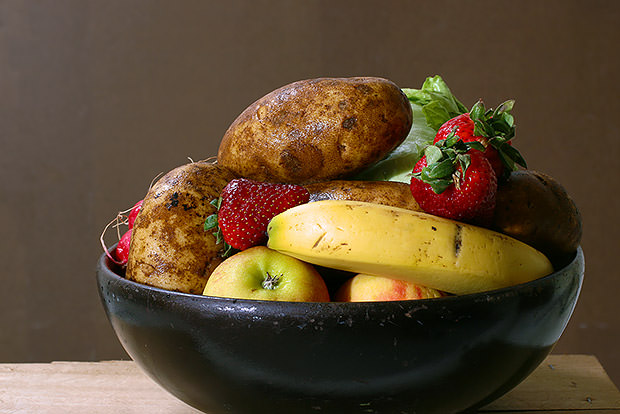
Opening the fridge to find your fruits and vegetables have spoiled is not only frustrating, it’s like tossing your food budget into the compost pile. Learning how to select and store fresh fruits and vegetables will help you increase the shelf life, so you can enjoy them longer.
Selecting the best produce
Everyone has tips and tricks for picking the right melon or apple, but there are a few general guidelines to follow to ensure you get the freshest produce possible.
- Avoid fruits and vegetables that have visible bruising or damage. This may cause them to spoil faster.
- The fruit or vegetable should be heavy for its size, which signals that it is fully mature and ripe.
- Produce should be tender to the touch, but it should not be mushy or soft.
- Sniff it. A pleasant aroma indicates ripeness. This is especially true when selecting melons.
- Talk to the produce manager at the supermarket and the vendor at the farmers market to find out when the food was harvested. The most delicious fruits and vegetables are those that ripen on the vine and those that are eaten soon after harvest.
Post-harvest ripening
Some fruits are climacteric, which means they ripen after they are harvested. Apples, avocados, bananas, kiwis, mangoes, pears, and tomatoes are good examples. As they ripen, these fruits release ethylene gas, which can cause other fruits and vegetables to spoil, so it's important to store climacteric foods separately from other produce. They need warm temperatures to speed ripening, and they will ripen over time when stored at room temperature. You can speed ripening by placing them in a paper bag for a day or two, which concentrates the ethylene gas.
Countertop storage
The first instinct is to put fruits and vegetables in the refrigerator to preserve freshness, but not all produce is best kept at cold temperatures.
- Bananas, mangoes, melons, pineapples, persimmons, tomatoes, and ginger are all best stored at room temperature. When ripe, most will last 3 to 5 days.
- Apples, avocados, kiwis, nectarines, peaches, pears, and plums can be ripened on the counter and then transferred to the fridge to extend shelf life. Apples can last up to a month in the crisper. Kiwis will last 7 to 10 days. Avocados, peaches, nectarines, plums, and pears will last 3 to 5 days.
- Most citrus fruits maintain the best flavor at room temperature and they will stay fresh on the counter for a week. You can extend the shelf life to several weeks by storing them in the refrigerator.
Refrigerator storage
Many fruits and the majority of vegetables are best stored at temperatures no higher than 40 degrees Fahrenheit. Store fruits and vegetables in separate crispers. Never store produce in sealed plastic bags. However, perforated bags can help preserve freshness. Avoid washing produce before storing it in the refrigerator as this can cause it to spoil quickly.
- Asparagus and summer squashes will last 4 to 5 days.
- Greens like kale and collards will last 2 to 5 days, while lettuces stay fresh for 5 to 7 days.
- Cauliflower and broccoli stay fresh for 3 to 5 days.
- Most varieties of peppers will keep for 1 week.
- Beets, carrots, cabbages, celery and radishes keep 1 to 2 weeks.
- Berries will last 2 to 3 days.
- Cherries and grapes will stay fresh for about 1 week.
Long-term pantry and cellar storage
Most root vegetables and winter squash can be stored for extended periods without spoiling. The best storage conditions are 50 to 60 degrees Fahrenheit in a well ventilated, dark area like a pantry or cellar, away from sunlight.
- Potatoes and sweet potatoes will keep for 1 to 2 weeks. Avoid direct light because it can cause potatoes to turn green. Also avoid storing potatoes and onions together. Each give off gases that can cause the other to spoil more quickly.
- Onions and garlic will stay fresh for 2 to 4 weeks.
- Winter squash can be stored for 3 to 6 months.



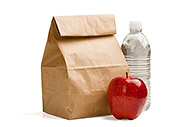 3 Healthy Lunches for Your Work Week
3 Healthy Lunches for Your Work Week
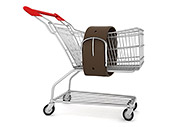 5 Tips for Stretching Your Budget for Healthy Food
5 Tips for Stretching Your Budget for Healthy Food
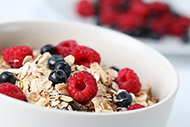 Best Ways to Reduce Added Sugar
Best Ways to Reduce Added Sugar
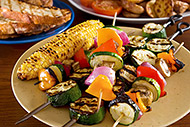 Healthy Tips to Lighten Up Picnic Foods
Healthy Tips to Lighten Up Picnic Foods
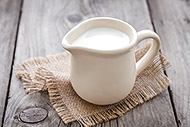 Do You Need to Drink Milk?
Do You Need to Drink Milk?
 Tips to Keep Track of Water Intake
Tips to Keep Track of Water Intake
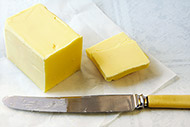 Butter vs. Margarine: What’s the Best Choice?
Butter vs. Margarine: What’s the Best Choice?
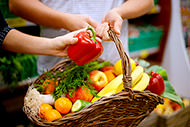 Healthy Eating Myths
Healthy Eating Myths

 Pinterest
Pinterest RSS Feed
RSS Feed